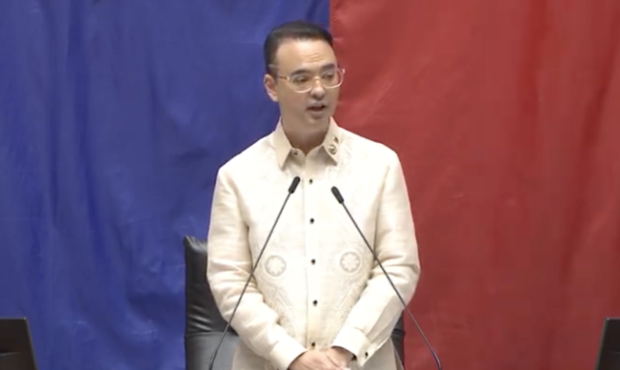
House Speaker Alan Peter Cayetano. (Photo from an RTVM video)
MANILA, Philippines — The House will realign funding for the government’s program to buy palay (unhusked rice) from local farmers, and the development of police and military camps nationwide, House Speaker Alan Peter Cayetano bared Tuesday.
In an interview before the start of the plenary debates on the proposed P4.1-trillion budget for 2020, Cayetano said these two programs were among those that he could “almost guarantee” to have more funding.
Cayetano said they would push to increase the P7 billion allocation for the rice program to “not lower than P9 billion” or “more” citing the drop in palay farm-gate prices being experienced by farmers in some provinces.
“‘Yung 7 billion na pambili ng palay ay kulang na kulang if we want to solve the crisis sa presyo ng palay,” the Taguig-Pateros representative added.
Camp development
The House leader also said they are eyeing an initial amount of P500 million each for the development of all Philippine National Police and Armed Forces of the Philippines camps in the country, stressing President Rodrigo Duterte’s “focus on security.”
“Ang point ko lang is that walang specific item ngayon sa budget so every time kung sino ang commander ng lugar nya naghahanap ng paraan, minsan lumalapit sa local government or sa DPWH,” Cayetano reasoned.
“So in the same manner that we have a school building program, we want to put a camp development fund,” he added.
The lawmaker, Duterte’s running-mate during the 2016 elections, also said they might augment the budget for the Commission on Higher Education, specifically for the implementation of the free tuition program.
Cayetano also said the funding needed for the full implementation of the Universal Health Care law would be studied.
The House appropriations panel approved Monday the committee report on the proposed P4.1-trillion national budget for 2020 after just two weeks of first-level deliberations.
READ: ‘Common practice’: House body OKs P4T 2020 budget behind closed doors
House Bill No. 4228 or the 2020 General Appropriations Bill, which becomes the General Appropriations Act or the national budget once enacted into law, will now be tackled at the plenary.
The chamber hopes to pass the expenditure plan on final reading by October 4. /jpv
RELATED STORIES:
House shows swiftness in bid to avoid repeat of budget delay
2020 budget ‘pork-less,’ House leaders assure